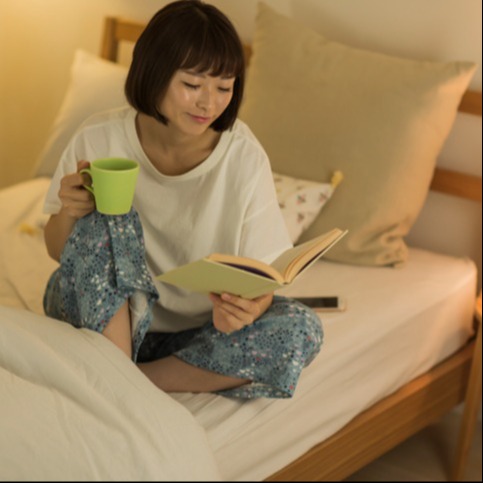
Discover a complete approach to improving your sleep with holistic solutions. By blending natural remedies, lifestyle adjustments, and mindfulness techniques, you can achieve better rest. Common methods include herbal teas, dietary changes, and soothing bedtime routines. Keep in mind that these approaches can work differently for everyone. As you explore how these elements work together, you might wonder: which combination is the key to truly restorative sleep?
Key Takeaways
Incorporate natural sleep aids like chamomile tea and tart cherry juice to promote relaxation and enhance melatonin production.
Establish a consistent sleep schedule and a calming pre-sleep routine to signal your body it's time to wind down.
Create an optimal sleep environment by maintaining a cool room temperature and reducing light and noise disturbances.
Practice mindfulness and meditation techniques to reduce anxiety and improve sleep quality, enhancing natural melatonin production.
Consider herbal remedies such as valerian root and lavender essential oil, ensuring you choose high-quality products from reputable brands.
Natural Sleep Aids: Home Remedies to Help You Sleep
As people look for effective ways to improve their sleep, natural sleep aids have become popular for their calming effects. Chamomile tea, packed with flavonoids, interacts with benzodiazepine receptors, helping you relax without caffeine. Tart cherry juice is also helpful, as it supports melatonin production, which is crucial for a healthy sleep cycle. Additionally, warm milk provides comfort, mimicking tryptophan's effects to make you feel sleepy. Glycine, an amino acid, has been shown to improve sleep quality, with just 3 grams being effective for many. Furthermore, L-Theanine, found in tea leaves, promotes calmness and improves sleep quality at doses up to 200 mg. Together, these natural sleep aids offer valuable alternatives to prescription options for a good night's rest.
Five Tips for Better Sleep
Getting restful sleep is essential for your overall health and well-being. To improve your sleep quality, try to stick to a consistent sleep schedule, going to bed and waking up around the same time each day. Develop a relaxing pre-sleep routine, like reading or taking a warm bath, to signal to your body that it's time to wind down. Limiting screen time at least an hour before bed can protect melatonin production, which is vital for sleep. Also, ensure your sleep environment is optimal by keeping your bedroom cool, ideally between 65 to 72 degrees Fahrenheit, to minimize disruptions. Finally, engaging in moderate aerobic exercise during the day can boost deep sleep without making it harder to fall asleep at night.
Exploring Herbal Remedies for Sleep
Many individuals seeking natural solutions for sleep disturbances turn to herbal remedies as a potential aid. Herbal supplements like valerian root, chamomile tea, and passionflower are often explored for their calming properties and ability to enhance sleep quality. Chamomile tea, rich in the flavonoid apigenin, has been linked to reduced insomnia and anxiety, promoting sleepiness. Valerian root shows mixed results in effectiveness, necessitating further research. Additionally, lavender essential oil is noted for enhancing sleep quality; its soothing scent may alleviate sleep disturbances, particularly in older adults. While these remedies offer promise, it's crucial to select high-quality products from reputable brands, as herbal supplements often lack FDA regulation, impacting safety and efficacy.
The Role of Mindfulness and Meditation in Sleep
How can mindfulness and meditation transform your sleep experience? Research shows that incorporating mindfulness and meditation into your nightly routine can significantly reduce sleep disturbances and improve sleep quality. Regular practitioners report up to a 30% decrease in insomnia symptoms. Practicing mindfulness meditation before bed promotes relaxation by helping you focus on the present moment, easing racing thoughts. Techniques like deep breathing and body scanning activate the body's relaxation response, lowering heart rates and stress hormones, which helps you drift off to sleep. Furthermore, these practices boost the body's natural melatonin production, further supporting a healthy sleep cycle. In essence, mindfulness and meditation are effective holistic methods for achieving better sleep duration and efficiency.
Creating a Calming Bedtime Environment
Incorporating mindfulness and meditation into your nightly routine sets the stage for a peaceful bedtime environment, which further enhances overall sleep quality. To encourage sleep, maintaining an ideal bedroom temperature between 65 to 72 degrees Fahrenheit is key for comfort. Eliminating bright lights by using blackout curtains and reducing electronic device use at least an hour before bed helps minimize blue light exposure, which can interfere with melatonin production. You can create a calming atmosphere with soothing colors, soft lighting, and comfortable bedding, signaling to your body that it's time to rest. Additionally, minimizing noise disturbances with white noise machines or earplugs contributes to better sleep, while an organized, clutter-free space promotes good sleep hygiene, ultimately leading to quality sleep.
Frequently Asked Questions
What Is the Most Effective Natural Sleep Aid?
Melatonin is often cited as the most effective natural sleep aid, known for its role in regulating sleep-wake cycles. Other notable options include valerian root and chamomile, each offering varying degrees of effectiveness for different individuals.
What Is the 10 3 2 1 Rule for Sleep?
The 10 3 2 1 rule for sleep suggests avoiding caffeine 10 hours before bed, not eating or drinking alcohol 3 hours prior, stopping work 2 hours before, and limiting screen time 1 hour before sleep.
What Is the Best Natural Remedy to Go to Sleep?
Chamomile tea is frequently considered the best natural remedy for sleep, recognized for its calming effects. It contains flavonoids that may promote relaxation, making it a popular choice for those seeking improved sleep quality.
What Do Native Americans Use for Sleep Remedies?
Under a starlit sky, Native Americans have turned to chamomile tea and passionflower to lull restless minds, while sweetgrass and ritualistic tobacco promote tranquility, intertwining nature’s gifts with cultural practices for peaceful sleep.
Count on https://drugmart.com When You Need to Import Prescription Drugs Through Canada When you work with https://drugmart.com, ordering medicine through Canada is easy, safe and cost-effective. You can rely on our reputable network of pharmacies to deliver the authentic drugs you need. If you're ready to import prescription drugs through Canada and our other verified international pharmacies, you can start today by browsing our available medications.
Sources
Hale, L., Troxel, W., & Buysse, D. (2020). Sleep health: an opportunity for public health to address health equity. Annual Review of Public Health, 41(1), 81-99. https://www.annualreviews.org/content/journals/10.1146/annurev-publhealth-040119-094412
Perrault, A., Kebets, V., Kuek, N., Cross, N., Tesfaye, R., Pomares, F., … & Yeo, B. (2024). A multidimensional investigation of sleep and biopsychosocial profiles with associated neural signatures.. https://www.biorxiv.org/content/10.1101/2024.02.15.580583v3
Garbarino, S. and Bragazzi, N. (2024). Revolutionizing sleep health: the emergence and impact of personalized sleep medicine. Journal of Personalized Medicine, 14(6), 598. https://www.mdpi.com/2075-4426/14/6/598





